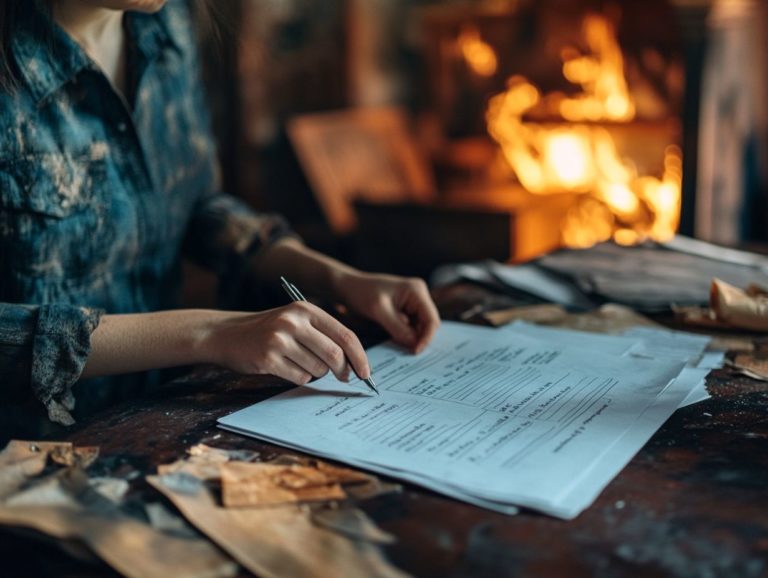5 Essential Documents to Support Your Claim
When you pursue a personal injury claim, having the right documentation is essential for constructing a robust case.
This discussion highlights five key documents police reports, medical records, witness statements, photographs, and financial documents that can significantly strengthen your claim.
It outlines the steps involved in filing a personal injury claim, explores the various types of claims you may encounter, addresses common challenges, and explains how an attorney can assist you in gathering and presenting your evidence.
Grasping these elements can truly make a difference in securing a favorable outcome.
Contents
- Key Takeaways:
- 1. Police Report
- 2. Medical Records
- 3. Witness Statements
- 4. Photographs and Video Evidence
- 5. Financial Documents
- What Is a Personal Injury Claim?
- Frequently Asked Questions
- What are the 5 essential documents needed to support my claim?
- Why is proof of purchase important for my claim?
- What should be included in my medical records for my claim?
- Are there any specific requirements for receipts to support my claim?
- Why is a police report important for my claim?
- Can I use witness statements as evidence for my claim?
Key Takeaways:
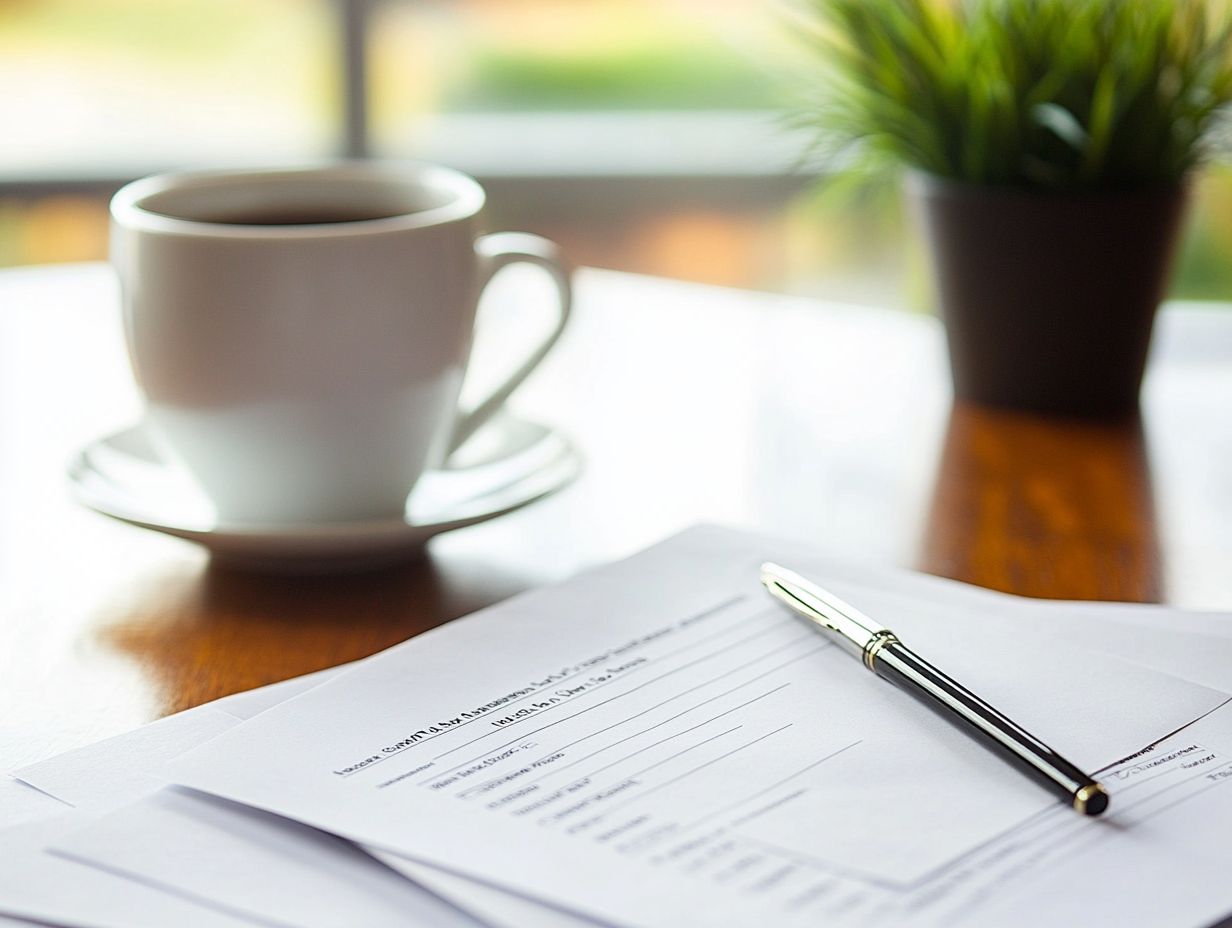
- A police report is crucial in supporting a personal injury claim, as it provides official documentation of the incident and any injuries sustained.
- Medical records serve as key evidence in a personal injury claim, showing the extent and severity of injuries and linking them to the incident.
- Witness statements from individuals who saw the incident can greatly strengthen a personal injury claim and provide valuable insight.
1. Police Report
The police report is a critical document in any personal injury case, especially in Calgary. It provides objective details surrounding the incident, including statements from officers of the Calgary Police Service.
This report serves as a critical piece of evidence, outlining essential information such as the time and location of the incident, witness accounts, and any citations that were issued. It plays a pivotal role in establishing who is at fault or responsible.
Getting the police report quickly is very important. Any delays could impede the collection of evidence or testimonials that are crucial in bolstering your claim.
By securing this report promptly, you can strengthen your case and craft a clearer narrative of the events leading to your injuries.
2. Medical Records
Medical records are essential in supporting your personal injury case. They meticulously document the injuries you’ve sustained, the treatments you’ve received, and the opinions of medical professionals that can greatly influence your compensation claim.
These records include a variety of documents, such as initial assessments, treatment plans, imaging results, and discharge summaries, all of which chronicle the progression of your injury over time.
By presenting this comprehensive information, providers can effectively illustrate the severity and complexity of your injuries. This documentation helps convey to legal representatives and insurance adjusters the genuine impact the incident has had on your life.
Ultimately, this detailed record not only strengthens your case but also bolsters the credibility of your experiences.
3. Witness Statements
Witness statements serve as invaluable evidence in personal injury cases, offering firsthand accounts of the accident that can either support or challenge the details noted in the police report.
These statements deliver a unique perspective that is crucial for understanding the events leading up to the incident, aiding in the establishment of fault and liability.
Gathering these insights often requires interviewing various individuals who may have witnessed the accident, ensuring their perspectives are documented accurately.
The credibility of these witnesses is paramount; juries and judges tend to place significant weight on their testimonies, particularly when those accounts align with the physical evidence presented.
In many instances, strong witness accounts can make a huge difference in your case, either fortifying the injured party s claim or providing essential context that may alter the case’s direction.
Don’t wait! Collect these documents today to strengthen your claim!
4. Photographs and Video Evidence
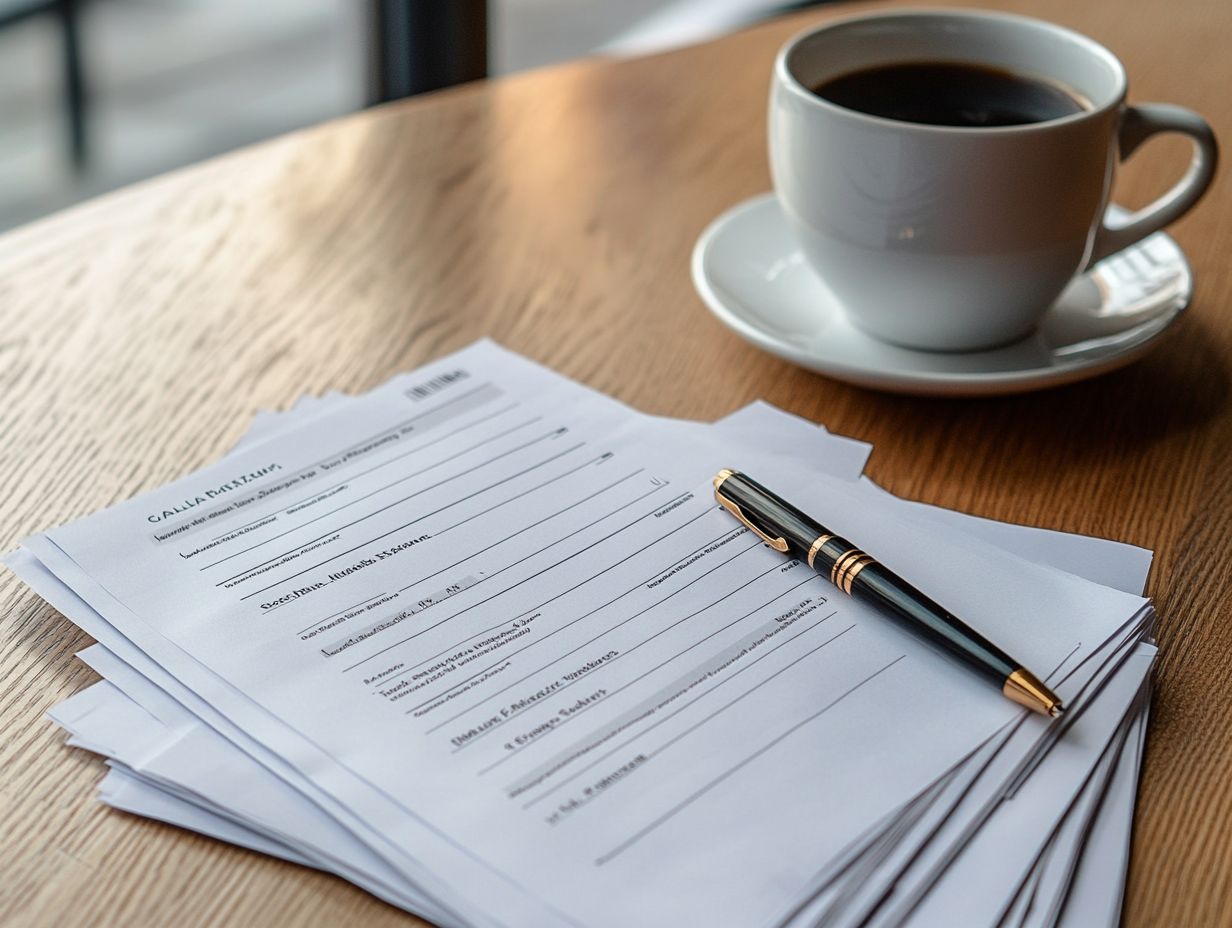
Photographs and video evidence are essential in personal injury cases. They provide visual proof that helps reconstruct accidents and strengthen insurance claims.
Different types of visual evidence include images of the accident scene, property damage, injuries, and witness testimonies captured on video. This evidence gives a complete picture of what happened.
To collect evidence effectively, take photos from various angles right after the accident. Verify the time and date stamps on those photos.
Video evidence from traffic cameras can change the game. Request that footage from local authorities as soon as possible. Don’t overlook social media; screenshots of relevant posts can provide valuable insights.
By collecting and preserving this evidence, you enhance your case’s credibility. This also reinforces the story you present to support your claim.
5. Financial Documents
Financial documents play a pivotal role in personal injury claims. They provide necessary proof of lost wages, medical expenses, and other economic impacts that underscore the compensation you seek.
These documents can vary significantly, from recent pay stubs and bank statements to detailed tax returns. They provide a comprehensive view of your overall income and financial stability.
Invoices related to medical treatments are particularly important. They present a clear and detailed picture of the actual expenses you’ve incurred due to the injury.
Gather these records carefully you need them to strengthen your claim and secure your compensation! Accurate documentation bolsters the validity of your compensation claim and ensures that all financial losses are thoroughly accounted for.
What Is a Personal Injury Claim?
A personal injury claim is your legal request for compensation stemming from an incident where you ve suffered injuries due to someone else’s negligence. Negligence means when someone fails to take proper care, leading to your injury.
This process includes accident reports, medical records, and legal representation to navigate the complex insurance claim landscape. Such claims can vary significantly in scope and context.
They address everything from car accidents and slip-and-fall incidents to medical malpractice and workplace injuries. Each category operates within its own legal framework, which is crucial for determining liability and the compensation you may be entitled to.
For anyone pursuing a claim, meticulous documentation is essential. Thorough records strengthen your case and help demonstrate the full extent of the damages you ve endured.
Understanding these nuances is vital for anyone seeking justice and fair compensation for their injuries.
What Are the Steps to Filing a Personal Injury Claim?
Filing a personal injury claim is a structured process that guides you through seeking compensation. It starts with evidence gathering and culminates in submitting an insurance claim for your damages.
To navigate this journey effectively, first gather essential documentation, including medical records, accident reports, and witness statements.
After compiling this evidence, consulting with legal representation offers invaluable insights. It clarifies your rights and responsibilities.
Next, you ll formally submit your claim, ensuring all requisite documents are included and deadlines are observed. During this phase, engaging in negotiations with insurance companies often aims to minimize payouts.
Keeping meticulous records and adhering to your schedule can significantly influence the outcome of your claim.
What Are the Different Types of Personal Injury Claims?
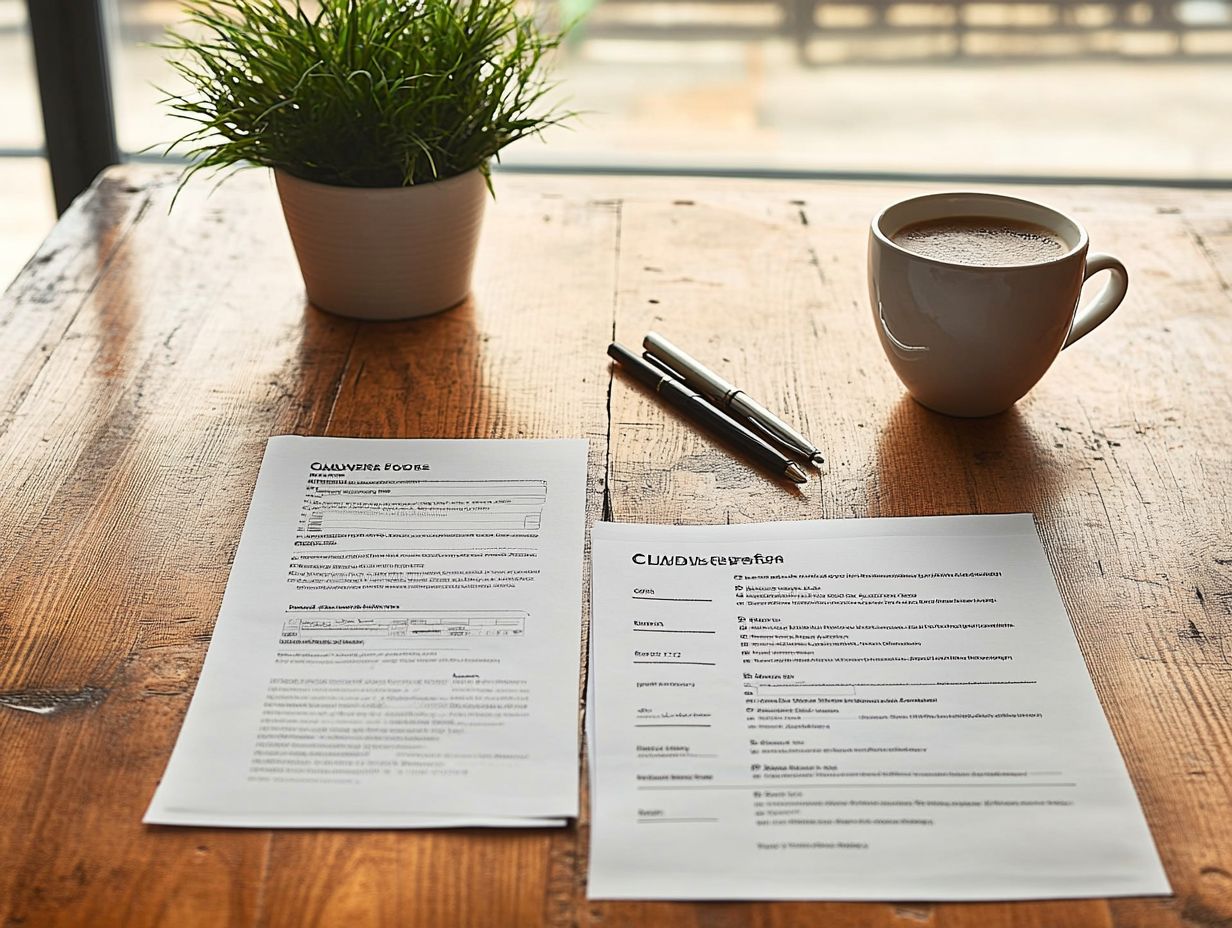
Personal injury claims encompass a wide range of cases, including medical malpractice, workplace accidents, and slips and falls. Each scenario has unique legal nuances and procedures for securing the compensation you deserve.
Medical malpractice typically arises when healthcare professionals fail to provide adequate care, resulting in injury or harm to patients. Workplace accidents often stem from unsafe conditions, necessitating a thorough investigation into who is responsible for the injury.
Slips and falls occur due to insufficient maintenance or hazardous conditions, placing the responsibility on property owners to maintain safety standards. Navigating each type of claim presents its own set of challenges, including gathering necessary evidence and understanding legal deadlines.
Dealing with insurance companies can be overwhelming, especially when they may be reluctant to offer fair settlements. Understanding these intricacies is crucial to effectively pursuing your claim and achieving the justice you seek.
What Are the Common Challenges in Supporting a Personal Injury Claim?
Supporting a personal injury claim often brings a host of challenges, such as gathering evidence, dealing with skeptical insurance companies, and navigating the appeals process if your initial claim is denied. Proving who is responsible for the injury and ensuring you have adequate medical documentation can feel daunting.
The negotiation tactics used by insurers often aim to minimize their payouts. To effectively tackle these obstacles, establishing strong legal representation is essential.
Experienced attorneys can help you gather the necessary documentation and facilitate negotiations, ensuring your rights are protected. Keeping meticulous records of your medical treatments and related expenses reinforces the validity of your claim and enhances your chances of a favorable outcome.
How Can an Attorney Help with Gathering and Presenting Evidence?
An experienced personal injury attorney plays a crucial role in gathering and presenting evidence. They use their expertise to build a compelling case that effectively communicates your injuries and damages to insurance companies and courts.
Attorneys conduct thorough witness interviews to obtain valuable testimonies about your incident. They meticulously gather essential medical records, ensuring every detail of your injuries is documented accurately.
If needed, attorneys may engage accident reconstruction specialists to analyze the scene and provide expert opinions that bolster your claims. This level of professional legal representation enhances the credibility of your case and maximizes your potential compensation.
You must seek expert help! For anyone injured, this is not just advisable; it s essential.
What Are the Possible Outcomes of a Personal Injury Claim?
The outcomes of a personal injury claim can vary, ranging from successful settlements to the possibility of an appeal if the initial claim is undervalued. Understanding these possible results is vital for anyone navigating this complex landscape.
A favorable settlement could provide financial relief, allowing you to cover medical expenses and recover lost income. Conversely, a jury verdict might yield even higher compensation, though it comes with uncertainties and the stress of litigation.
If your claim is denied, it could lead to financial strain and the need for further legal action. It s important to have a clear strategy and realistic expectations as you move forward with your case.
Frequently Asked Questions
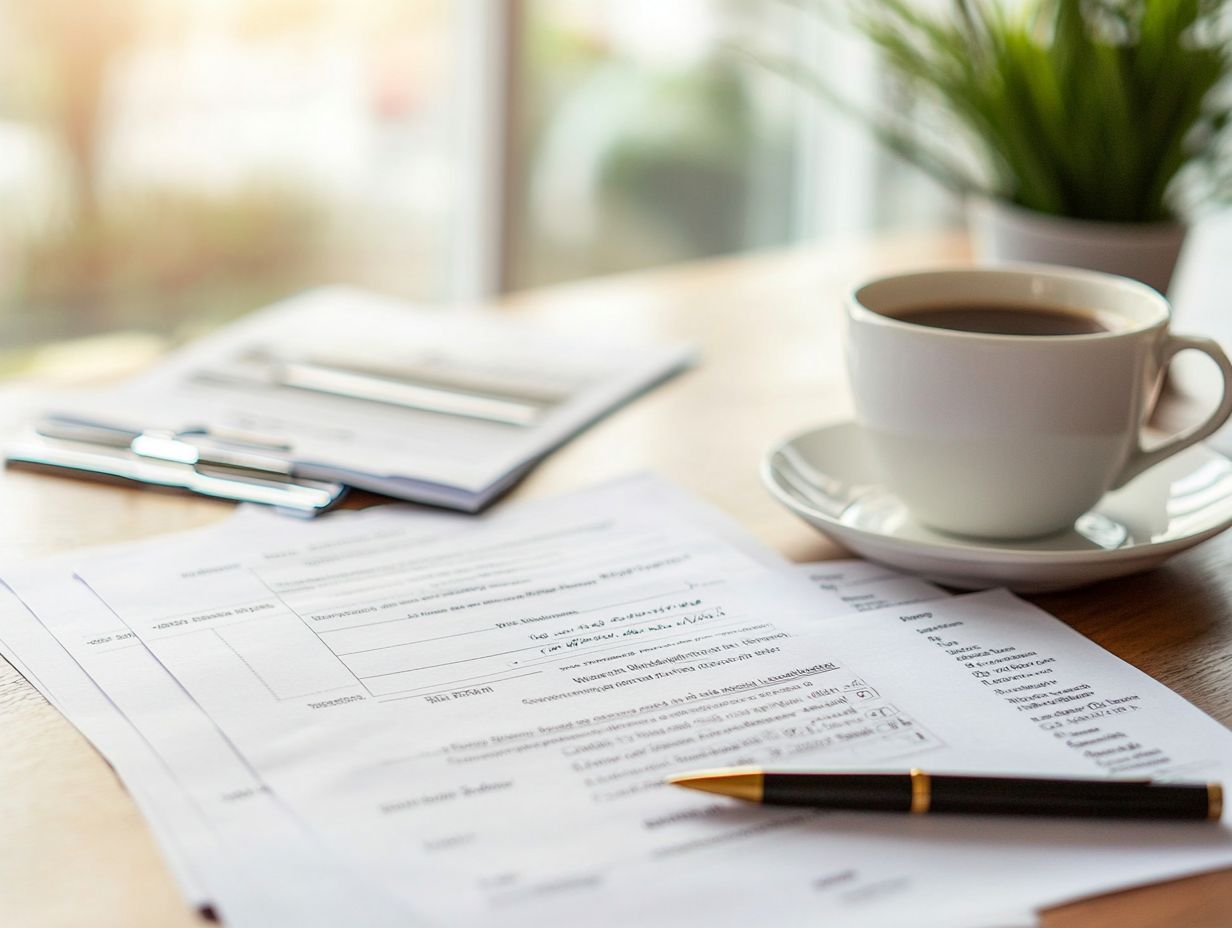
What are the 5 essential documents needed to support my claim?
The 5 essential documents are: 1) proof of purchase, 2) medical records, 3) receipts for expenses, 4) police reports, and 5) witness statements.
Why is proof of purchase important for my claim?
Proof of purchase is your ticket to making a successful claim! It shows that you bought the item or service, which helps prove ownership and the value of your claim.
What should be included in my medical records for my claim?
Your medical records need to detail your injury or condition. Include treatments you ve received and any future medical needs related to your claim.
Are there any specific requirements for receipts to support my claim?
Yes, receipts must include the date of purchase, business name, item description, and the amount paid. Make sure they are dated close to when the incident occurred!
Why is a police report important for my claim?
A police report provides an official record of the incident. It includes relevant details that can help support your claim and strengthen your case.
Can I use witness statements as evidence for my claim?
Absolutely! Witness statements are valuable evidence, especially from those who witnessed the incident and can share what happened firsthand.

